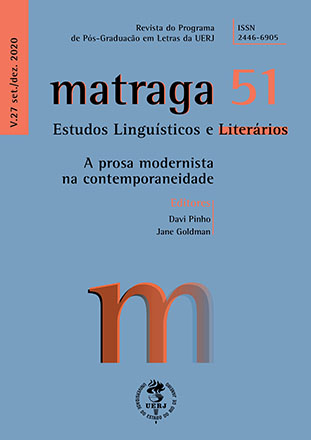The discursive recreation of technology in Oswald de Andrade: a non-conventional reading
DOI:
https://doi.org/10.12957/matraga.2020.48645Keywords:
Technology, Literary discourse, Oswald de Andrade.Abstract
The research focused on the issue of imported technology brought to Brazil, mainly from Europe, during the Old Republic period and investigated how Oswald de Andrade (1890-1954) discursively integrated this technological reality in his work Manifesto Pau-Brasil (1924). Oswald recreates this reality in a dialogical way, elaborating a portrait of the country in which the local color manifests itself from traditions that go back to the colonial and imperial past, also encompassing a certain popular and everyday culture in which religiosity, beliefs, superstitions clash that are in opposition to technological modernity. From this confrontation, tense and dynamic, a certain national identity emerges as a result of polarized dimensions, but that interpenetrate, without excluding themselves. The dialogic resource is intensified by a perspective in which the impasses, unevenness and disjunctions of this polarization are manifested, as well as its organic coexistence. We explored the articulation between the technical universe and literary language, a theme that is barely dealt with in critical readings in the field of Literature studies.Downloads
Downloads
Published
How to Cite
Issue
Section
License
Authorization
Matraga – Scientific Journal of the Post-graduate Program in Arts and Humanities of UERJ is authorized to publish the article submitted here, if it is accepted for online publication. It is attested that the contribution is original, that it is not being submitted to another publisher for publication, and that this statement is the expression of truth.
The works published in Matraga's virtual space – Scientific Journal of the Post-graduate Program in Arts and Humanities of UERJ will be automatically transferred, and your copyright is reserved to Matraga. Its reproduction, in whole or in part, is conditional on the citation of the authors and the data of the publication.

Matraga uses license Creative Commons - Attribution-Non-Commercial 4.0 International.





